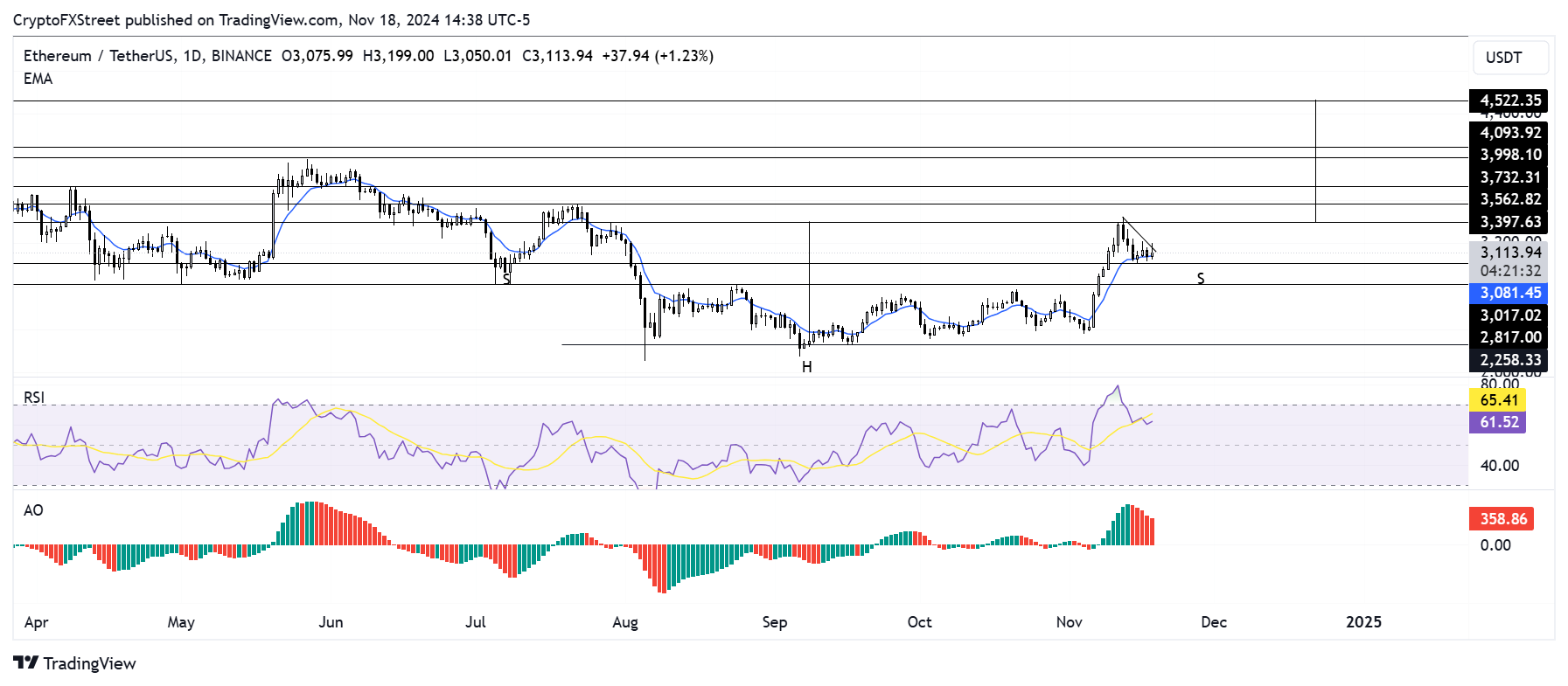Ethereum Price Forecast: ETH risks decline to $2,258 as exchange reserves continue uptrend
Ethereum price today: $3,110
- Ethereum exchange reserves increased by over $545 million during the weekend, indicating rising selling pressure.
- Ethereum ETFs recorded $515.5 million inflows last week, its highest since launch.
- Ethereum risks decline to $2,258 if it falls below the 14-day EMA and $2,817 key support level.
Ethereum (ETH) is up 1% on Monday after ETH ETFs hit a record $515.5 million inflows last week. However, rising exchange reserves and realized losses could trigger bearish pressure for the top altcoin.
Rising Ethereum exchange reserve could induce bearish pressure
Ethereum's exchange reserve continued its uptrend over the weekend, rising by over 181,000 ETH worth ~$545 million. An asset's exchange reserve increase indicates that selling pressure could rise. Hence, the chart below shows that investors are potentially selling ETH.
-638675562295405951.png)
Ethereum Exchange Reserve
Additionally, Ethereum's Network Realized Profit/Loss shows investors realized nearly $1 million in losses on Monday, per Santiment data.
Meanwhile, spot Ethereum ETFs in the US recorded net inflows of $515.5 million last week — their highest weekly net inflows since launch on July 23, per Coinglass data. Last week, the products also posted their highest single-day positive flows with inflows of $295.5 million on November 11.
The demand from US institutional investors pushed the global ETH ETF net inflows last week to $646 million, which is 5% of their total asset under management (AuM), per CoinShares data.
According to Bloomberg analyst Eric Balchunas, most of these positive flows could be traced to the lingering effects of the US presidential election's aftermath.
THE BENDS: Ethereum ETFs have made a quick and sudden rise from the deep dark depths of cumulative outflows following the Election, finally into fresh air and net inflows. What a chart.. @JSeyff pic.twitter.com/CpzhkHTykG
— Eric Balchunas (@EricBalchunas) November 18, 2024
Ethereum Price Forecast: ETH risks decline to $2,258 if key support level fails
Ethereum is trading near $3,100 after sustaining over $42.39 million in liquidations in the past 24 hours. Liquidated long and short positions accounted for $28.43 million and $13.96 million, respectively.
ETH has been consolidating near the $3,000 psychological level in the past five days since seeing a rejection at the resistance level close to $3,400.

ETH/USDT daily chart
The top altcoin has been held above $3,000 by the 14-day Exponential Moving Average (EMA) support. If ETH declines below the 14-day EMA and the $3,017 support level fails, it could find support at the $2,817 key level, which bulls have defended for nearly four months — April to July.
A breach of the $2,817 key level could send ETH toward $2,258.
The Relative Strength Index (RSI) is above its neutral level and tilting sideways, indicating bulls are finding it difficult to maintain momentum. Meanwhile, the Awesome Oscillator (AO) has posted consecutive decreasing red bars above its neutral level, indicating a weakening bullish momentum.
A daily candlestick close above the $3,400 level will invalidate the thesis and flip ETH's outlook to a bullish picture.
Ethereum FAQs
Ethereum is a decentralized open-source blockchain with smart contracts functionality. Its native currency Ether (ETH), is the second-largest cryptocurrency and number one altcoin by market capitalization. The Ethereum network is tailored for building crypto solutions like decentralized finance (DeFi), GameFi, non-fungible tokens (NFTs), decentralized autonomous organizations (DAOs), etc.
Ethereum is a public decentralized blockchain technology, where developers can build and deploy applications that function without the need for a central authority. To make this easier, the network leverages the Solidity programming language and Ethereum virtual machine which helps developers create and launch applications with smart contract functionality.
Smart contracts are publicly verifiable codes that automates agreements between two or more parties. Basically, these codes self-execute encoded actions when predetermined conditions are met.
Staking is a process of earning yield on your idle crypto assets by locking them in a crypto protocol for a specified duration as a means of contributing to its security. Ethereum transitioned from a Proof-of-Work (PoW) to a Proof-of-Stake (PoS) consensus mechanism on September 15, 2022, in an event christened “The Merge.” The Merge was a key part of Ethereum's roadmap to achieve high-level scalability, decentralization and security while remaining sustainable. Unlike PoW, which requires the use of expensive hardware, PoS reduces the barrier of entry for validators by leveraging the use of crypto tokens as the core foundation of its consensus process.
Gas is the unit for measuring transaction fees that users pay for conducting transactions on Ethereum. During periods of network congestion, gas can be extremely high, causing validators to prioritize transactions based on their fees.

